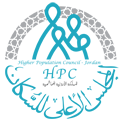

A Jordanian delegation participated in the 3rd Share-Net International Cocreation Conference (Cocreation: Engaging in Knowledge Translation Together) in Columbia on 5-7/7/2022. Organized by Share-Net International and Share-Net Columbia, under the theme “Access to Quality Information on Sexual and Reproductive Health and Rights” (Technologies, accessibility, knowledge translation, emerging challenges such as combatting misinformation).
The delegation consisted of representatives of HPC-hosted Share-Net Jordan, the Higher Council for the Rights of Persons with Disabilities, the Royal Health Awareness Society, a representative of youth, as well as a number of Jordanian institutions who attended the event remotely via zoom.
The conference aimed to present the latest knowledge and evidence on access to quality information on reproductive health and rights, identify areas that require change, the type of knowledge products and the processes needed to improve policies and programs, develop knowledge products and outputs in partnership with content and media specialists, analyze and formulate messages, the language used in knowledge products, ensuring access to the target audience, launching a call for SNI small grants applications that will focus on the implementation of these knowledge products, and providing the opportunity for learning, exchange and communication between international actors on sexual and reproductive health.
Where the committee prepared a report on Jordan’s situation regarding the topic of the conference to show the current situation and progress made in Jordan with regard to sexual and reproductive health rights, using national strategies, reports and studies on this subject. The report included important issues affecting SRH, and presented examples from institutions working in this field, and touched on NGOs in Jordan and their role. The report also touched on the importance of developing national legislation regulating information.
Ali Al-Mutlaq, Director of the Studies and Policies Unit at the Higher Population Council and Share-Net Jordan Coordinator, said that Share-Net Jordan formed a community of practice from the relevant national authorities to prepare for this conference. The community of practice prepared a report on the status of Jordan with respect to the topic of the conference and progress made in Jordan with regard to sexual and reproductive health rights based on relevant national strategies, reports and studies. In this regard, the report also touched on the importance of developing national legislation to regulate information in this field.
The report tackled the definition of knowledge translation, the importance of linking research to policy, decision-making, planning and practice, and showed that one of the main links in the knowledge chain is translating knowledge into policies, laws and regulations.
The report emphasized that the development of SRH strategies depends on the evidence and data contained in reports and studies prepared in this regard, and pointed to the challenges facing SRH in Jordan, including the quality and organization of data and communication between decision makers and researchers.
The report indicated that Jordanian institutions, especially the Ministry of Digital Economy and Entrepreneurship, are pioneering in the use of information and communication technology to support health, in general, and sexual and reproductive health in particular, thereby serving as a key example of harnessing technology for development and health while guaranteeing confidentiality and privacy of information as well as supporting the governing ethics.
The report indicated that persons with disabilities constitute a significant proportion in society and institutional initiatives are driven towards enhancing their productivity and wellbeing and enacting legislation to support them. The report considered that access to SRH information for people with disabilities is a right that official institutions and civil society organizations seek to achieve.
The report further noted that the great challenge for SRH practitioners is the prevalence of misinformation, and that the Covid-19 pandemic has clearly shown the impact of misinformation in shaping individuals' attitudes towards many issues and lessons learned from this situation. The report stressed that media represent a bridge between service providers and service users, process on these issues, facilitating access to SRH information. Official and privately-owned media outlets are a cornerstone for promoting SRH-related concepts and trends as well as solutions and services developed by government institutions and private entrepreneurs and solution developers.
The report also highlighted the challenges of accessing SRH information at the individual, community and national levels, including social and cultural barriers and lack of coordination with respect to the quantity, quality and timing of created and shared information in a manner that helps prioritize, develop and implement evidence-based solutions, as well as lack of specialized SRH media.
The report proposed a number of initiatives that address gaps and challenges, including organizing meetings and workshops that bring together policy makers and researchers to establish better communication, link policies to scientific evidence, urge researchers to better understand the policy environment and implementation capacity, conduct a study on the SRH needs of older persons, train medical and mental health professionals to deal with the needs of the older persons, support longitudinal studies of the effects of SRH issues on the health of women and men, and support studies that look into the contribution of SRH diseases to the overall disease burden







